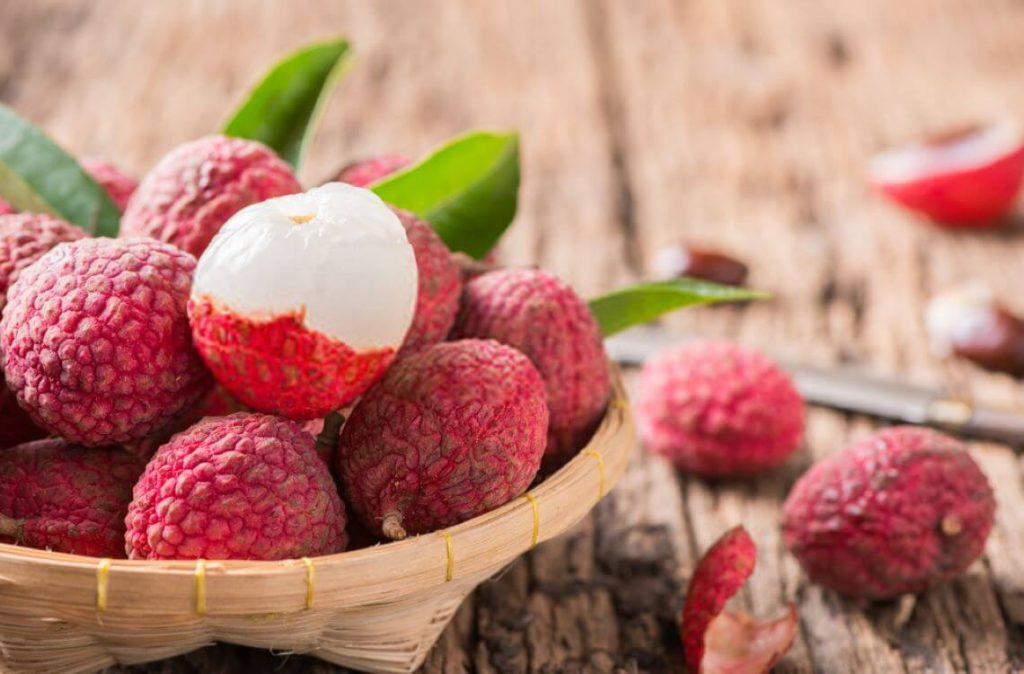Mothers-to-be can sometimes crave for a certain type of foods or drinks. Some can be beneficial while some might have detrimental side effects on pregnant mothers. Thus, you have to be strict on your diets. Today we will delve into the fruit called lychee and all you need to know about this deliciously sweet fruit.
Dietary Information
Benefits Of Lychee
1. Antioxidant properties
Lychee contains a good amount of antioxidant Vitamin C, Vitamin B-complex and phytonutrient flavonoids. These are effective in preventing chronic heart diseases. It also helps in healthy ageing as Vitamin C prevents free radicals from damaging your skin and counters early signs of ageing.
2. Prevents tissue and organ damage
If your body doesn’t get enough antioxidants it will not be able to squash free radicals that cause oxidative stress. Lychee is rich in antioxidants and can safeguard your body from oxidative stress and maintain your health during pregnancy.
3. Stronger Immune System
Pregnancy is a difficult time as the body is more prone to diseases. Lychee has a high level of vitamin C that helps in improving your immune system keeping you safe from infections and diseases. So it protects from degenerative disease and prevents arthritis. Lychee is also effective in protecting us from asthma.
4. Maintains Fluid Balance in the Body
Potassium is required to maintain the sodium level in our body. A small amount of potassium present in Lychee is helpful in regulating your body fluids (balance electrolyte). That, in turn, control your heartbeat and blood pressure which reduces the risk of stroke and heart attack.
5. Aids in Digestion
As Lychee is rich in dietary fibres, it prevents indigestion and constipation by improving bowel movements.
6. Weight management
Lychee is rich in Polyphenol which helps in managing weight, treating liver damage and also works on type 2 diabetes. Lychee is rich in Vitamin C which aids enzyme reactions to turn fat into energy faster in your body. It is beneficial for keeping pregnancy weight in check as fibre-rich foods have proved to suppress appetite and increase metabolism.
7. Prevents haemorrhoids and varicose veins
Rutin is a compound in lychee that strengthens your blood vessels and prevents them from breaking easily. This effectively treats varicose veins and haemorrhoids.
8. Helps in the production of Red Blood Cells
Lychee is a rich source of nutrient that is required for the production of blood. It provides manganese, magnesium, copper, iron and folate that are required for the formation of red blood cells (RBC).
9. You heal faster
Lychee gives you a lot of Vitamin C that repairs your tissues and it helps to prevent bleeding, thus improving the speed at which our bodies can heal wounds faster. It helps your body absorb iron and maintains the health of your bones and teeth as well.
Vitamin C helps to build collagen in the body, the fibrous protein in our bodies that connects and supports other bodily tissues.
10. Anti-influenza Virus Action
Oligonol, a low molecular weight polyphenol, is found abundantly in lychee fruit. Oligonol is thought to have anti-oxidant and anti-influenza virus actions. In addition, it helps improve blood flow in organs, reduce weight, and protect skin from harmful UV rays.
Side Effects of Lychee
1. It Increases Heat in the Body
Eating too many lychees during pregnancy can increase internal heat in your body which may lead to various complications in your pregnancy. It is known to cause an imbalance in the body, giving rise to some conditions such as a sore throat, bleeding nose, mouth ulcers and more.
2. Haemorrhage
Eating too many lychees may lead to haemorrhage during pregnancy, which may serve as possible triggers for it. Lychee can also cause haemorrhage when taken with herbs and supplements such as Ginkgo Biloba, garlic or saw palmetto.
3. Diabetes
Lychee also spikes up sugar levels in the blood which may lead to the development of diabetes during pregnancy. The excess sugar in the fruit will cause a sudden surge in blood sugar levels. This, in turn, will increase the risk of gestational diabetes and worsening any other condition if you already have it.
4. Allergies
Consuming lychees in excessive amounts may lead to various allergies. Lychee might cause allergic reactions in people who are allergic to birch, sunflower seeds and other plants from the same family, mugwort, and latex. Eating more lychees can lead to itching, swelling of lips, hives, etc.
5. Lowers Blood Pressure
Overeating lychees can lower your blood pressure to dangerous levels. This can cause conditions such as blurred vision, dizziness, cold, and nausea. It can also in some cases cause shallow breathing and extreme tiredness.
6. Bleeding risks
Lychees can increase the risk of bleeding when they interact with drugs such as:
- Aspirin
- Anticoagulants (heparin or warfarin)
- Antiplatelet medications (clopidogrel)
- NSAIDs (naproxen or ibuprofen).
Special Precautions & Warnings:
“Auto-immune diseases”
Lychee might cause the immune system to become more active. This might increase the symptoms of auto-immune diseases. If you have an auto-immune condition, it is best to consume lychee cautiously until more is known. Examples of auto-immune condition:
- Multiple sclerosis (MS),
- Lupus (systemic lupus erythematosus, SLE),
- Rheumatoid arthritis (RA)
Overall, not enough is known about the use of lychee during pregnancy or breastfeeding. So, it is better to just stay on the safe side. Eat no more than seven pieces of lychee in a day. Make sure the lychees are in good condition as well.
Pregnant and breastfeeding mothers are encouraged to meet and discuss with your doctor or dietician before you make any decision on your diets.
